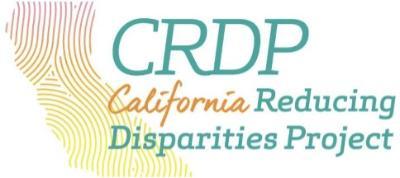
The California Reducing Disparities Project (CRDP), Phase I, was developed in response to disparities that exist in mental health care for diverse populations. Mental health disparities are well documented, especially as they relate to access, availability, quality, and outcomes of care. CRDP Phase II is designed to build on and implement strategies developed in Phase I and identified in the CRDP Strategic Plan. Phase II focuses on strengthening and demonstrating the effectiveness of population-specific interventions and developing and reinforcing infrastructure to effectively deliver mental health services to impacted populations. The vision for CRDP Phase II is a California in which all individuals, regardless of race, ethnicity, sexual orientation or gender identity, receive quality mental health prevention and treatment services delivered in a culturally and linguistically competent manner.
The central component of CRDP Phase II are the Implementation Pilot Projects (IPP) representing 5 priority populations (African American, Asian and Pacific Islander, Latino, Native American and LGBTQ communities). Thirty-five groups will implement Community-Defined Evidence Practices (CDEP) that provide culturally competent prevention and early intervention services to members of a CRDP target population. Five population-specific Technical Assistance (TA) Providers will work with IPP to develop their administrative, programmatic and evaluation capacities. Education, Outreach and Awareness Consultants (EOA) will be engaged to help bring together community stakeholders and resources to increase awareness of mental health issues in impacted communities, address barriers to reducing mental health disparities, and inform local policy makers and administrators about issues impacting unserved, underserved and inappropriately served communities.
As the statewide evaluator on this project, PARC@LMU will use a Community-Based Participatory Research (CBPR; also referred to as Community-Based Participatory Practice - CBPP) integrative mixed methods multi-year approach to discern best practices associated with the implementation of culturally defined evidence practice as well as CRDP Phase II’s achievement of its objectives. The CRDP II Statewide Evaluation framework will track the change process overall and within the three CRDP II components (IPP, TA, EOA). It will attend to the importance of organizational, community, cultural, and historical contextual conditions. PARC will examine reductions in mental health disparities and improvements in mental health outcomes from a public health perspective supported by a social-ecological framework attending to culture and the simultaneous effects of multiple social identities. Application of a community ecological framework in the statewide evaluation plan will provide a lens for developing a more contextual, nuanced understanding of mental health as both a reflection of and a contributing factor towards community-level mental distress. Along with PARC’s multi-ethnic, multi-disciplinary team members, the statewide evaluation will draw on the expertise of The Alliance—the partnership among the ethnic-specific psychological associations (e.g., AAPA, ABPsi, NLPA), The Indigenous Wellness Research Institute, and the APA Division 44 focused on LGBTQ issues.
Please follow the link below to view the CBPR Best Practices in Community-Based Participatory Practice:
CRDP Phase I
Please follow the links below to view the Priority Population Reports from CRDP Phase I:
- African American CRDP Population Report
- Asian and Pacific Islander CRDP Population Report
- Latino CRDP Population Report
- LGBTQ CRDP Population Report
- Native American CRDP Population Report
CRDP Phase II
Please follow the links below to view the Executive Summary and full Statewide Evaluation Report from CRDP Phase II:
Please follow the link below to view a publication that resulted from CRDP Phase II. The article addresses the role of culture in prevention and early intervention strategies:
Please follow the link below to learn more about CRDP Phase II:
CRDP Phase II Extension
In 2022, the California Reducing Disparities Project concluded Phase II. Due to its strong record of success, evaluation, and vested stakeholder group, the project was provided an additional $63.1 million to continue operation.